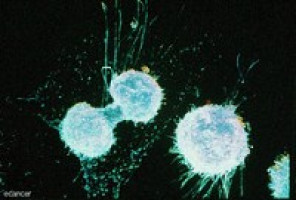
A paper in the latest issue of Cell outlines characteristics on the cell’s surface that could predict the mutated oncogenes that will be present in a patient’s cancer.
This finding is the latest step in the ongoing quest for a more precise way to predict the risk of cancer at the cellular level as scientists seek a greater understanding of the relationship between the immune system, oncogenes and cancer development.
For the current study, Joan Font-Burgada, an assistant professor in cancer biology at Fox Chase Cancer Center, Hannah Carter, PhD, assistant professor of medicine at UC San Diego School of Medicine, and colleagues closely examined molecules in the Major Histocompatibility Complex class I (MHC-I).
The MHC displays peptides from inside on the cell’s surface, which allows T-cells to detect foreign or mutated peptides that exist inside cells.
The team hypothesized that cancer mutations could hide from T-cells by exploiting gaps in presentation.
To test this, they developed a patient-based MHC-1 presentation score and compared 9,176 patient-specific score profiles across 1,018 recurrent oncogenic mutations.
“We hypothesized that knowledge of the MHC-I genotype could predict the subset of oncogenes in a given cancer that are more likely to acquire mutations,” said Font-Burgada. “This could have real clinical application predicting cancer risk, which could lead to more precise detection and screening based on patient’s MHC-I genotype.”
Font-Burgada, Carter, Rachel Marty, a graduate student in Carter’s lab, and other computational biologists at UC San Diego School of Medicine, used the latest computational biology methods to generate over a billion possible predictions.
They found that individuals with effective MHC presentation of a cancer-causing mutation are less likely to develop tumours harbouring that mutation.
Conceptually, for an oncogenic mutation to be highly prevalent in human cancer, it must not only confer a growth advantage to tumour cells, but it must also occur in the context of peptides that are poorly presented by most human MHC-I alleles.
“The region of the genome encoding MHC-I is highly diverse,” Carter said. “Everyone’s genotype is a little different. Our study shows that differences between people’s immune systems translate to differences in the molecular characteristics of the tumours they develop.”
“This conceptual framework establishes fundamental concepts in cancer biology that will allow future implementation of predictive tools to determine personal susceptibilities to cancer mutations and specific types of cancer,” said Font-Burgada.
Jon Chernoff, chief scientific officer for Fox Chase Cancer Center, said the paper could be key to better understand risks of cancer.
“It has long been recognised that some populations are more susceptible to certain types of cancer, but we don’t yet understand why,” Chernoff said. “This work provides a possible explanation by suggesting that cancer causing mutations may be suppressed by an individual’s own immune system, eliminating some types of tumours just as they are getting started.”
Source: Fox Chase Cancer Center